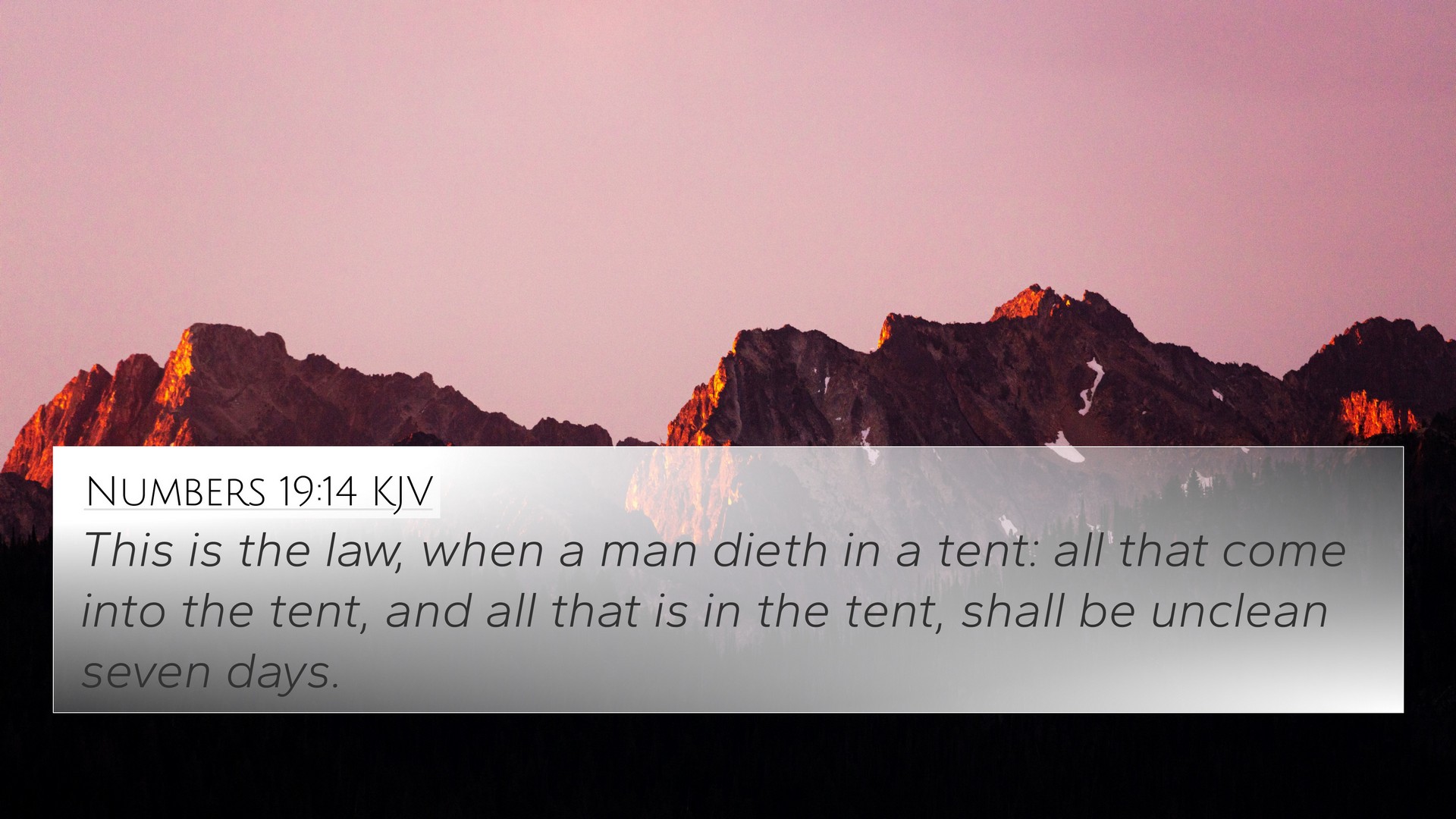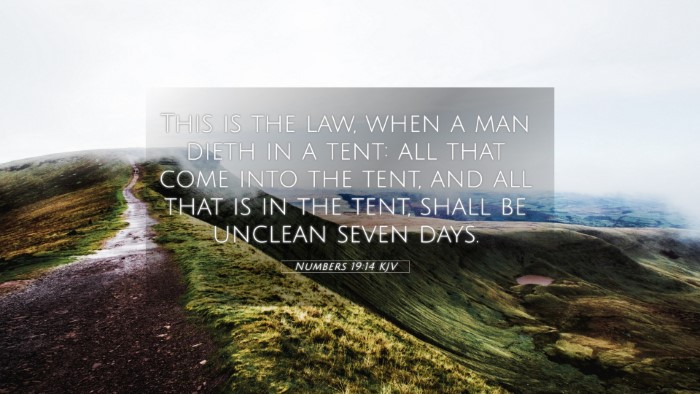Understanding Numbers 19:14
Verse: "This is the law when a man dies in a tent: all who come into the tent and all who are in the tent shall be unclean seven days." (Numbers 19:14)
Summary of Meaning
Numbers 19:14 discusses the ceremonial laws regarding uncleanness upon contact with death, reflecting the broader themes of purity, holiness, and the significance of life and death in the Israelite community. This verse specifies that anyone who enters a tent where a dead body lies is considered unclean for seven days, indicating the gravity of death's impact on ceremonial cleanliness.
Commentary Insights
The insights from public domain commentaries help elucidate the deeper meanings behind this verse:
- Matthew Henry: He emphasizes that the laws concerning uncleanness are designed not only to maintain physical cleanliness but also to remind the Israelites of the consequences of sin, which ultimately leads to death. Death is a serious matter, and God desires His people to be aware of its implications in their spiritual lives.
- Albert Barnes: Barnes interprets the verse in terms of the social and community dynamics within Israel. By observing these laws, the Israelites are reminded of the seriousness of death and the necessity of remaining pure to be in God’s presence. He notes that this law acts as a protective measure to prevent impurity and maintain holiness among the people.
- Adam Clarke: Clarke points out that the seven days of uncleanness symbolize a period of purification. He adds that this law has both a practical and a spiritual aspect: it teaches the people about the seriousness of life and death, while also reflecting God’s holiness and the need for atonement for sins.
Biblical Context
The context of Numbers 19:14 is crucial to understanding its meaning. This chapter deals with the laws of purification concerning death, which were especially significant in the camp of Israel, where ritual purity was essential for maintaining the presence of God among His people.
Connections Between Bible Verses
This verse connects with several other scriptural texts that deal with the themes of uncleanness, death, and purification:
- Leviticus 11:24-25: Discusses the impurity caused by touching certain dead animals.
- Numbers 9:6-7: Refers to the case of those who were unable to offer the Passover due to being ceremonially unclean because of a dead body.
- Hebrews 9:27: Asserts that man is destined to die once, echoing the seriousness of mortality echoed in Numbers 19:14.
- 1 Corinthians 15:26: States that the last enemy to be destroyed is death, linking to the themes of life and the freedom from the curse of death through Christ.
- Romans 6:23: Explains that the wage of sin is death, reminding readers of the spiritual implications of death corresponding to the natural implications in Numbers 19:14.
- Revelation 21:4: Promises a new creation where there will be no more death, tying back to the hope that transcends the laws concerning death and uncleanness.
- Luke 8:54-55: Jesus raises a girl from the dead, showing His power over death, which correlates with the uncleanness discussed in Numbers.
Theological Implications
The theological implications of this verse are expansive:
- Ritual Purity: The law emphasizes the importance of maintaining purity in relation to God’s holiness. Death symbolizes the consequence of sin, making this a pivotal concern for the Israelites.
- Foreshadowing of Christ: The regulations also point forward to the cleansing work of Christ, who deals with the spiritual uncleanness that sin brings.
- Community Responsibility: The communal aspect of the law underscores the collective responsibility to uphold holiness, affecting not just the individual but the entire community of Israel.
Application for Today
For contemporary readers, Numbers 19:14 serves as a reminder of the weight of sin and death. It encourages believers to uphold a lifestyle of purity and to recognize the gravity of spiritual uncleanness while also embracing the redemptive work of Christ that brings cleansing and new life.
Tools for Bible Cross-Referencing
To delve deeper into the connections within Scripture, consider the following tools:
- Bible Concordance: A listing of verses that can help you find cross-references easily.
- Bible Cross-Reference Guide: A helpful resource for exploring thematic connections across different scriptures.
- Cross-Reference Bible Study: A method for comparing related passages to gain a fuller understanding of biblical teachings.
- Comprehensive Bible Cross-Reference Materials: Tools and resources that aid in understanding connections throughout the Bible.
Conclusion
Numbers 19:14 is a profound verse that connects deeply to themes of purity, community responsibility, and the impact of sin. Understanding its place in the broader narrative of Scripture helps illuminate the path of redemptive history and the ultimate victory over death through Christ. Cross-referencing and engaging with related scriptures can enrich one’s study and understanding of the Bible's message.


